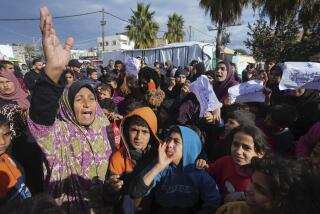Cuban Hurricane Preparation Offers Lessons in Organization
Cubans have no Astrodome or cruise ships to house evacuees, and meals-ready-to-eat usually consist of rice and beans.
But they have weathered some of the most violent storms the tropics can churn up, with surprisingly low death tolls and almost perfect compliance with evacuation orders.
Last year, United Nations emergency relief coordinator Jan Egeland singled out Cuba for praise among Caribbean nations for hurricane evacuation planning. When Hurricane Ivan swiped the island last September, for example, Cuba didn’t record a single death, but 115 people died regionally. The same month, Hurricane Jeanne killed more than 1,500 in Haiti, many drowning in floodwaters.
Now, as analysts and politicians examine how the U.S. government responded to Hurricane Katrina -- and how to avoid a similar catastrophe -- some say this communist island may offer a few lessons.
Cuban evacuations are mostly carried out by community groups that take cues from the government. The military assists, unarmed.
“Cuba views hurricanes as a top national security priority, and they know the drill,” said Daniel P. Erikson, Caribbean specialist at the Inter-American Dialogue, a Washington think tank. The storms not only imperil lives, he said, but threaten Cuba’s economic underpinnings: agriculture and tourism.
“The drill” Erikson refers to includes yearly military exercises across the island, with two-day training sessions for emergency workers, simulated evacuations and reviews of emergency plans.
During hurricanes, Cuba’s four state-run television stations run nonstop evacuation orders and weather reports. The coverage is anchored by President Fidel Castro, who coordinates response during live broadcasts as if waging battle against an invading army.
“It’s an organized system, in a pyramid structure,” said Dr. Gabriel Diaz Ramirez, a Cuban pediatrician dispatched to Indonesia this year to treat tsunami survivors. “We have our government’s support.”
Perhaps the most striking element of Cuba’s disaster preparedness is that most residents obey evacuation orders without question. The government says it evacuated 1.5 million people in July ahead of Hurricane Dennis. Most went to safe zones, and 245,000 flocked to state-run shelters.
This contrasts starkly with New Orleans, where thousands decided to ride out the storm and were later plucked from flooded attics or perished. Others are still refusing to leave, even with toxic muck on the streets and armed forces moving in to carry outmandatory evacuations.
Erikson suggested that the smooth displacements were a product of the government’s tight control over residents.
“It’s still a police state,” he said. “You could say one advantage they may have is the ability to move large numbers of people in a short amount of time.
“But of course the political environment in Cuba makes it difficult to resist those kinds of orders.”
More to Read
Start your day right
Sign up for Essential California for news, features and recommendations from the L.A. Times and beyond in your inbox six days a week.
You may occasionally receive promotional content from the Los Angeles Times.






